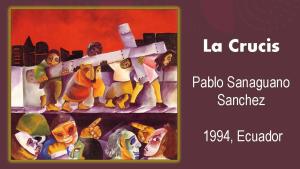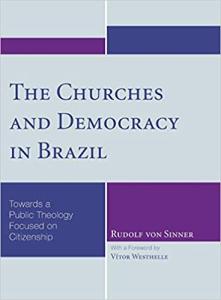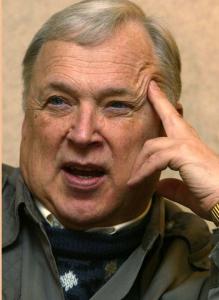 The Public Theology of Rudolf von Sinner
The Public Theology of Rudolf von Sinner
Patheos PT 5001
Brazilian Rudolf von Sinner is one of the world’s leading public theologians. We interview him in this Patheos post.
If you want more resources on Public Theology, click here.
What is public theology?
What is public theology? We will ask Rudolf von Sinner. He will tell us that there are many definitions. Even so, public theologians can gather together and focus on important matters confronting the public sphere.
Brazilian theologian Rudolf von Sinner chairs the Executive Committee of the Global Network for Public Theology (GNPT). Currently, the GNPT has released a call for papers for its upcoming 6th international conference, October 3-6, 2022, on “Public Theologies in Vibrating Cities: Precious and Precarious,” in Curitiba, Brazil.
In this Patheos series we are asking: what is public theology? We have interviewed a number of conscientious public theologians who are passionate about the common good. Meet Katie Day, Binoy Jacob, Robert Benne, Noreen Herzfeld, Paul Chung, Kang Phee Seng, Mwaambi Gideon Mbûûi, and Karen Bloomquist. Here are more Public Theology Resources. Our working notion has been this: public theology is conceived in the church, critically honed in the academy, and meshed with the world for the sake of the world’s common good.
How do you and the Global Network for Public Theology define “Public Theology”?
RUDOLF VON SINNER. There is no one single definition of public theology in its conceptual and contextual definition. There has been quite a bit of discussion on this. Asking, “what is public theology?” occupied the first issues of the International Journal of Public Theology, which was founded by and together with the Global Network of Public Theology (GNPT) in 2007.

In fact, it is a continuous discussion. Therefore, I always speak of “a” and not “the” public theology. What we in some way all share among those who use the term is a concern about the role and place of religion and theology in the public sphere. We understand the public sphere to be the space in which public opinion and position is formed and debated, namely through organizations of civil society, among them Christian churches.
I myself focus on public theology as a theology of citizenship in Brazil. I understand citizenship not restricted to one nation, to one specific country. Rather, a citizen is entitled and aware of rights and duties as well as having effective access to recognition, protection, health, education, leisure and the like according to such human and fundamental rights. Citizenship is, therefore, an inclusive and not exclusive concept.
Public theology also critically analyzes the factual presence of the religions, mainly of Christian churches, in specific public spheres. The public theologian discusses the pertinence of such presence and constructively provides orientation to both the churches and state authorities on such presence. The public theologian offers contribution (and not imposition) from within civil society, while being in constant dialogue with other religions, other associations of civil society and the academy. As resources, the public theologian harvests both Scripture and its tradition and interpretation throughout the centuries and an interdisciplinary interpretation of contemporary society in a global context.
Curitiba, October 3-6, 2022. What will the Global Network for Public Theology accomplish?
RUDOLF VON SINNER. The Curitiba conference has as its main theme “Public Theologies in Vibrating Cities: Precious and Precarious”. As stated on the Global Network of Public Theology’s website (gnpublictheology.net), the rationale behind the theme is that “Cities vibrate, shine, resonate.” They are vibrant, tourist brochures tell us – lively, that is, interesting for those who seek for good food, nightlife, and entertainment. But much more than that, public life is vibrating. What do these vibrations mean? What kind of vibrations are we feeling? Which ones are we systematically closing our senses to?
 Cities are both precious and precarious. They represent the precious: creativity, mobility, sound, colour, construction, organization, interaction. But they also feature the precarious: poverty, traffic jams, noise, smog, destruction, chaos, exclusion. A diversity of publics, of interests, of beliefs, of needs, of longings and belongings emerge from the cities.
Cities are both precious and precarious. They represent the precious: creativity, mobility, sound, colour, construction, organization, interaction. But they also feature the precarious: poverty, traffic jams, noise, smog, destruction, chaos, exclusion. A diversity of publics, of interests, of beliefs, of needs, of longings and belongings emerge from the cities.
Thus, by amplifying our understanding on publics and theologies, by appreciating the preciousness and discovering the precariousness, by realizing that there is preciousness in what is considered precarious, and that there is precarity in what is regarded as precious, we believe that there may be a more complete analysis of cities’ ambiguities and the critical and constructive role public theology can play in this context.”
For the first time, this 6th GNPT Consultation works with 14 Working Groups approved by the Executive, under one of which a paper can be submitted for presentation at the Consultation. Among them are groups touching on migration, cities in Asia, affordable and sustainable housing, theological education in future cities, gender and sexuality, ecology, digitality, Dietrich Bonhoeffer, political and public theologies and so on (for a full list with names and affiliation of the co-ordinators and a short description see the mentioned website).
The Call for Papers & Registration

RUDOLF VON SINNER. The Call for Papers is open until 01 March, 2022. A proposal can be sent according to the norms stated in the Call for Papers (https://gnpublictheology.net/
Registration opens on 01 April, online, when the conference fee of EUR 150,00 (BRL 150,00 or equivalent for Latin Americans) is due to confirm registration. We are aware that while for some this is a very reasonable amount, in many parts of the world this is a high sum; the applicant may, thus, signal how much he or she can pay and this will be analyzed and decided upon by the Executive. The Consultation will be held on the Campus of the Pontifical Catholic University of Paraná at Curitiba and be transmitted only for registered participants who wish to participate remotely. It is, thus, a hybrid conference format. For any questions, please contact [email protected]. Welcome!
Conclusion
TED PETERS AGAIN. The public theologian cannot avoid playing conceptual volley ball. On one side of the net is globalization. On the other side of the net is contextualization. In 1979 the World Future Society coined the operative phrase, “think globally, act locally.” Von Sinner thinks about the vibrancy of cities around the globe. Yet, he also recognizes that local and contextual assessment and action. Princeton public theologian, the late Max L. Stackhouse, tried to formulate the concern.
Globalization, understood in its more complex meanings, could be “for good” — both lasting and for human well-being. It could promote a highly pluralistic global civilization with increased prospect for peace with justice. In the final analysis, however, it is unlikely co happen unless it finds its focus in Christ as Lord, for Christ is the one who has, and can ever and again, renew the covenant between God and humanity, and point souls toward reconciliation with God and neighbor, and societies coward a New Jerusalem.
Now, I prefer the term, planetization, over globalization. But, that’s beside the point.
I believe the public theologian’s vision of the common good includes the principle of subsidiarity. The good of the individual and the good of the local context must remain in dialectical interaction with the overall common good. We see this dialectic in the work of Rudolf von Sinner, and we thank him for it.
▓
 Ted Peters is a Lutheran pastor and emeritus seminary professor. His one volume systematic theology is now in its 3rd edition, God—The World’s Future (Fortress 2015). He has undertaken a thorough examination of the sin-and-grace dialectic in two works, Sin: Radical Evil in Soul and Society (Eerdmans 1994) and Sin Boldly! (Fortress 2015). Watch for his forthcoming, The Voice of Public Christian Theology (ATF 2022). See his website: TedsTimelyTake.com.
Ted Peters is a Lutheran pastor and emeritus seminary professor. His one volume systematic theology is now in its 3rd edition, God—The World’s Future (Fortress 2015). He has undertaken a thorough examination of the sin-and-grace dialectic in two works, Sin: Radical Evil in Soul and Society (Eerdmans 1994) and Sin Boldly! (Fortress 2015). Watch for his forthcoming, The Voice of Public Christian Theology (ATF 2022). See his website: TedsTimelyTake.com.
▓













